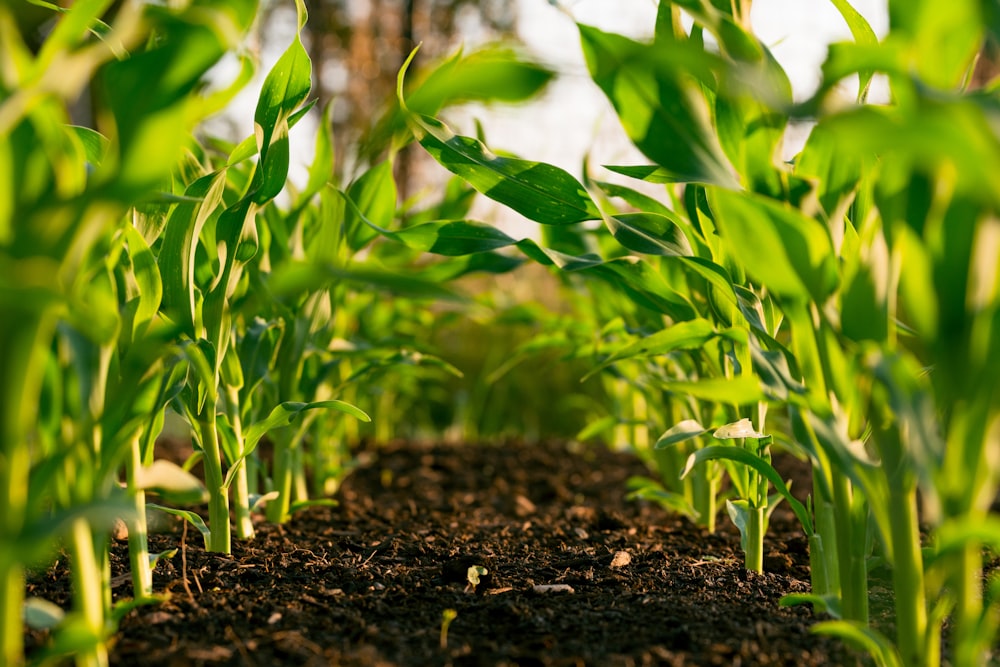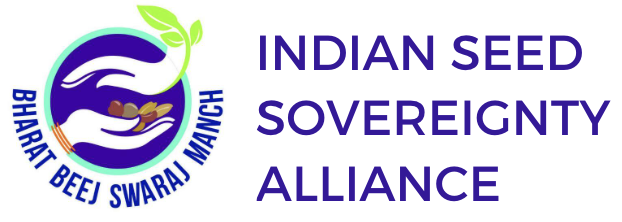Protect Your Seeds, Protect Your Future
The Seed Treaty (International Treaty for Plant Genetic Resources for Food and Agriculture) is being changed in ways that could harm farmer communities and indigenous peoples, worldwide. New proposals favour large corporations over small farmers, threatening food security, traditional seed systems and farming practices.
The Bharat Beej Swaraj Manch (India Seed Sovereignty Alliance), and other farmers organisations and civil society organisations have sent a comprehensive letter to world leaders expressing critical concerns with ensuring transparency and accountability in the implementation of the International Seed Treaty.
What is the Seed Treaty?
The Seed Treaty is formally known as The International Treaty on Plant Genetic Resources for Food and Agriculture (ITPGRFA). It is also known more widely as "Plant Treaty".
The Seed Treaty aims to bring countries together in conserving and sharing seeds and/or other propagating materials to improve food security. For this purpose, it has created a multilateral access and benefit sharing system (MLS), currently covering 64 important food and forage crops. With the MLS, countries and their researchers could get access to genetic diversity across the world in these selected crops and share benefits arising from their research, both in monetary and non-monetary terms.

Why Are We Concerned?
The Seed Treaty's MLS is currently working without transparency and accountability—once seeds leave their country of origin, contributing farmers and national authorities have very limited information on the recipients of seeds and what their research outcomes are.
Instead of improving accountability and transparency, there's now a push to expand the MLS to include seeds from all plants (currently 64 plants are included), further weakening oversight and governance.

The Current Problems:
Proposed Changes That Worry Us Even More
Recent proposals to change (amend) the seed treaty and MLS could make things worse for farmers and communities, while benefiting large corporations. The Working Group that proposed amendments, neglected the mandate to consider implication on farmers' rights of the proposed measures and worked on a single point agenda of making MLS attractive to Seed Companies.
Expanding without accountability
Proposals to expand from 64 crops to all plant varieties without fixing current problems in governance, accountability and transparency.
Missing Farmer Protections
While Farmers' Rights under the Seed treaty already remain rhetoric, no practical safeguards are proposed to ensure increased scope of MLS do not limit farmers' rights. With no information going to farmers on the exchange of seeds, there is not even scope for vigilance.
Legitimizing Digital Biopiracy
Sequence Information is being generated from seeds under MLS and shared anonymously via the internet regardless of national laws and farmers' rights. New proposals seek to legitimize this practice.
Eroding National Seed Sovereignty
Remember, Treaty MLS was designed as a limited exception to the Convention on Biological Diversity. Now it seeks to cover all plants. It's a complete wash out of national sovereign rights over plant genetic resources.
The Balance Problem
The new proposals create an uneven system:
Strong Rules on:
Expanding the plant genetic resources (seeds and other propagating materials) that countries must share
Weak Rules on:
Benefits sharing and payments from recipients of seeds
Bad Rules on:
- Reporting to make confidentiality the rule, undermining transparency
- Use of digital sequence information and sharing of benefits arising from use of such information, legitimizing digital biopiracy
No Rules on:
- Protection of farmers' rights to seeds and their traditional knowledge
- Promoting farmers' involvement and oversight on seed research and breeding
- Vigilance against fraudulent IPRs, and biopiracy
- Expanding scope of benefit sharing

Farmers Worldwide Speak Out: It's About Rights, Not Just Revenue
What We're Asking From FAO and Seed Treaty Secretariat
We're calling for fair and transparent changes to the seed treaty that protect farmers' rights and ensure benefits reach the communities that need them most.
1. Full Transparency
- Make information about seed sharing open and accessible
- At the bare minimum, national authorities and contributing farmers need to know who gives and receives seeds
- Track the SMTAs, and record when the transfers happen
- Share Digital Sequence Information on MLS seeds only through Treaty's Global Information System and accountable databases, subject to user registration and identity verification
- Report who makes payments and how much
- Ensure research results are published with the Global Information System of the Treaty linked to appropriate accessions
2. Open Consultation with Farmers
- Ask farmers worldwide what they expect from the MLS
- Share farmer concerns with all Parties to the Seed Treaty
- Include farmers' text proposals in the negotiating draft for Governing Body and other Working Groups
- Ensure real farmer voices are heard, not just company lobbyists
3. Reject the current package of measures, start over, do it right
Reject the current package of measures, as both the content of the package and the process in which it was developed are biased.
Restart the process to enhance MLS with better priorities:
- Put farmers' rights first
- Make MLS accountable and transparent; End Biopiracy including digital biopiracy
- Ensure fair sharing of benefits and avoid diversion of seeds for purposes beyond the Treaty
- Seek benefits from all purposes covered under the Treaty, not just from seed sales
- Implement measures to prevent illegal or irregular movement of seeds without free, prior, informed consent of farmers
- Stop pressurizing developing country governments from concluding a bad deal that wash out their sovereignty over plant genetic resources
Final Letter Sent to World Leaders
Final Letter to World Leaders
The Bharat Beej Swaraj Manch (India Seed Sovereignty Alliance) has finalized and sent a comprehensive letter to world leaders addressing critical concerns about the International Seed Treaty.
Letter addressed to:
Director General, FAO (Mr. QU Dongyu)
Secretary, ITPGRFA (Mr. Kent Nnadozie)
Letter Summary:
"We urge immediate attention to the Draft Package of Measures submitted to 11th Governing Body of the ITPGRFA (Seed Treaty)—without consensus—by the Ad Hoc Open-ended Working Group to Enhance the Functioning of the MLS. The package fails to address existing problems and introduces proposals that risk deepening current flaws.
Our demands:
• Publish and report to Governing Body details about MLS Seed Transfers until date.
• Organize worldwide consultation with Farmers Organizations
• Reject the present biased draft package and initiate new process prioritizing farmers rights and improvements in MLS governance
• Protect Farmers' Rights at every stage of MLS operations, as well as prevent biopiracy, and digital biopiracy
• Ensure fair and equitable sharing of benefits arising from the use of PGRFA
• Refrain from pressurizing developing country governments to accept proposals that compromise national seed sovereignty
The lack of accountability has fundamentally undermined not only benefit sharing, but also, promoted biopiracy and digital biopiracy, and more concerningly, reduced farmer's rights into mere rhetoric."
Global Signatories to the Letter
290 Organizations from 52 Countries
Organizations listed by continent and country, with website links where available
Benin (1)
- Réseau Jinukun
Ethiopia (8)
- PELUM
- Agri Service Ethiopia
- Ethio-Organic Seed Action (EOSA)
- MELCA
- Institute for Sustainable Development
- Ethiopian Biodiversity Institute (EBI)
Kenya (1)
- Ecological Organic Agriculture Initiative of AU/ CAADP
Nigeria (1)
- Nigeria Soybean Association
South Africa (3)
- African Centre for Biodiversity
- Biological Systems Consulting & Research
- Nkuzi Development Association NPC
Zambia (2)
- Small Scale Farmers Africa
- Muchinga Sustainable Development Initiative for Action on Climate Change
Zimbabwe (1)
- Njeremoto Biodiversity Institute (NBI)
Bangladesh (1)
Cambodia (1)
Indonesia (2)
- Indonesia for Global Justice (IGJ)
- KONPHALINDO
India (162)
- AAKSS Society of Farmers
- Annadana Soil & Seed Savers Network
- Abdul Nazir Sab State Institute for Rural Development & Panchayat Raj (ANSSIRDPR)
- Anti K rail Samithi
- ARPAN
- Alliance for Sustainable and Holistic Agriculture
Malaysia (6)
- Pertubuhan Alam Sekitar Sejahtera Malaysia-GRASS
- Sahabat Alam Malaysia - Friends of the Earth
- Third World Network
- Consumers' Association of Penang
- Malaysian Paddy Farmers Solidarity Association (PeSAWAH)
- Forum Kedaulatan Makanan Malaysia (FKMM)
Nepal (1)
- All Nepal Peasants Federation
Sri Lanka (3)
- Food First Information & Action Network of Sri Lanka (FIAN)
- Lanka Organic Agricultural Movement
- Miridiya Organization
Vietnam (1)
- Center of Initiatives on Community Empowerment & Rural Development (ICERD)
Japan (4)
- Biodiversity Information Box
- Japan Organic Agriculture Association
- OK Seed Project
- Organic Shizukuishi
Philippines (1)
Argentina (30)
- Asociación Ciudadana por los Derechos Humanos
- A.C.A.G
- Agrupación Florestal Peroniste (AFOPE)
- Asamblea Ambientalista
- Asamblea Popular por el Agua
- Asamblea Por La Vida Chilecito
Brazil (3)
- Centro Palmares de Estudos e Assessoria por Direitos
- Espaço Feminista do Nordeste para a Democracia e os Direitos Humanos
- Núcleo de Estudos em Agroecologia e Produção Orgânica do Vale do Itajaí
Bolivia (1)
- Reacción Climática
Chile (1)
- Guardadoras de Semillas Tradicionales de Chiloé
Colombia (3)
- Grupo de Trabajo Psicosocial Astrolabias
- Red Solidaria Colmena Rsc
- REPEM LAC
Costa Rica (1)
Ecuador (1)
El Salvador (1)
- Colectiva Feminista para el Desarrollo Local
Guatemala (1)
- Federación de Cooperativas Agrícolas de Productores de Café de Guatemala
Peru (3)
- Asociación Nacional de Productores Ecológicos del Perú (ANPE)
- Centro de Culturas Indígenas del Perú (CHIRAPAQ)
- Cooperativa Agraria Cafetalera Acpc Pichanaki
Puerto Rico (1)
- Organización Boricuá De Agricultura Ecológica
Mexico (33)
- Asociación Para La Igualdad Y El Desarrollo Ambiental Sustentable (APIDAS AC)
- Campaña Sin Maíz No Hay Pais
- Casa De Abejas
- Centro de Derechos Indigenas Flor y Canto
- Centro de Estudios de la Región Cuicateca
- Centro de Estudios Interdisciplinarios en Agrobiodiversidad
Venezuela (1)
- Red de Cooperación Amazónica Redcam
Latin America (Regional) (1)
- Red Ecofeminista Latinoamericana y Del Caribe
Germany (1)
Netherlands (2)
- Agroecology Network
- NaNa Bio BV
Poland (1)
- Samopomoc Chlopska
Portugal (1)
United Kingdom (1)
- Oxford Allotments Association
Ukraine (1)
- Institute of Socio-Economic Regional Studies
